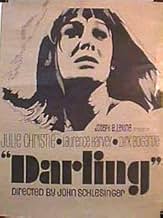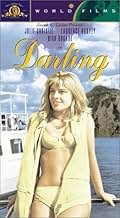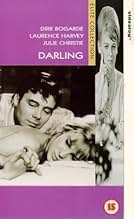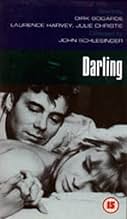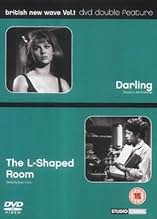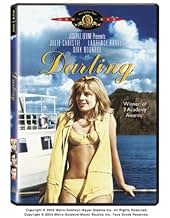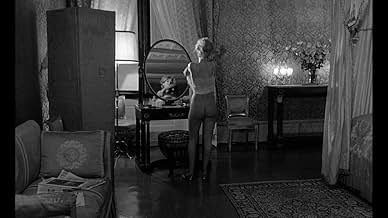CALIFICACIÓN DE IMDb
7.0/10
8.4 k
TU CALIFICACIÓN
La bella pero amoral modelo Diana Scott se abre camino con el sueño hasta la cima de la moda londinense en el apogeo de los Swinging Sixties.La bella pero amoral modelo Diana Scott se abre camino con el sueño hasta la cima de la moda londinense en el apogeo de los Swinging Sixties.La bella pero amoral modelo Diana Scott se abre camino con el sueño hasta la cima de la moda londinense en el apogeo de los Swinging Sixties.
- Dirección
- Guionistas
- Elenco
- Ganó 3 premios Óscar
- 17 premios ganados y 8 nominaciones en total
José Luis de Vilallonga
- Prince Cesare della Romita
- (as Jose Luis De Vilallonga)
T.R. Bowen
- Tony Bridges
- (as Trevor Bowen)
Opiniones destacadas
Darling (1965)
A black and white, Mod London romance and its aftermath, over and over, with all the tumult and glitz of the times. The events race forward and create a real tornado of activity, centering around one woman, Diana Scott, who is perfectly played by Julie Christie. Diana is as charming and beautiful as the actress who plays her, and she is drawn to men, to the movies, to modeling, and generally to success and ruin, up and down, in a wild ride.
British movies had a vigorous neo-realism (British New Wave) movement in the late 50s and early 60s, and by the time of this film it had segued into a purely celebratory pop mode, cashing in on the times, and the British Invasion in music. "Darling" is kind of in both worlds, I think, the same way the 1964 "A Hard Days Night" is in both, though they are very different films. But there is a frankness to the filming that belies the (at first) entertaining and largely fictional subject. And unlike the earlier neo-real innovators ("Loneliness of a Long Distance Runner" etc.), the focus here is on a privileged class, and on the rising fortunes of Diana as she moves from one relationship to another.
The filming gives these seemingly flighty, alternately glib and sad events a somberness they need. Director John Schlesinger was a British New Wave upstart, and would later do the American masterpiece "Midnight Cowboy," which might be said to have the same mixture of inventive fiction and believable raw realism.
Diana is a superficial woman who cashes in on her good looks and fun temperament, and her many men never seem to mind at first. She leads, but she also get towed along, falling in love, never seeming to be quite as happy as she should. Indeed, the movie begins with her explaining through a voice-over her inner yearning for what matters in life, since it's so hard to otherwise tell. Toward the end, in Italy (after England and France had been exhausted), she says to her newest man, "If I could just feel complete." And she means it. But then, in the next scenes, she's having fun again, telling lies and losing her bearings.
Christie is a marvel, really, even though you might just say she's playing herself (though not acting out the events in her life, we hope). This is her breakout film (along with her next film, "Dr. Zhivago"), and she really does typify the Mod English girl, fresh and carefree. There is even a very brief nude shot, from behind, that is a sign of mid-60s liberation in both life and in filmmaking. Dirk Bogarde is certainly excellent, too, and subtle, and indeed the whole cast is first rate, maybe because everyone is playing their contemporary selves with fictional names.
So the movie is terrific, even if it sometimes seems to keep meandering through the paces over the whole two hours. It wraps you in its world. Inevitably the outcome is as somber as the greys of the filming. What else would happen to someone who can't find love, or happiness, or meaning? It's impossible to really feel complete, as a person, if you search outside yourself too much, and hers is a superficial world of her own making, Diana is a superficial woman with lots of unexplored depth.
The writing here is totally first rate, the filming is first rate, the editing and pace first rate. It's simply a well made movie about a contemporary dilemma. "Thank God it's never too late," she says at the end, and in fact you know that she should really say, "God, everything stays the same." I don't think there is meant to be an echo here of Grace Kelly in particular, but there is a similar arc to Diana's career (and her name, of course, predicts a later Princess Diana). Diana's apparent sexual freedom is laden with that old convention of marriage (which she early on wisely says she doesn't want) and so some extent she can be a freewheeling young woman partly because she is always taken care of, and increasingly so. An interesting take on whether this is an accurate picture at all of the times is in this short apolitical article: www.socialistreview.org.uk/article.php?articlenumber=10813.
This movie ranks, for me, almost up there with "Alfie" and "Georgie Girl" (two of my favorites) as a look at the times in England. Honest, sometimes disturbing, and artistically considered. Don't miss it.
A black and white, Mod London romance and its aftermath, over and over, with all the tumult and glitz of the times. The events race forward and create a real tornado of activity, centering around one woman, Diana Scott, who is perfectly played by Julie Christie. Diana is as charming and beautiful as the actress who plays her, and she is drawn to men, to the movies, to modeling, and generally to success and ruin, up and down, in a wild ride.
British movies had a vigorous neo-realism (British New Wave) movement in the late 50s and early 60s, and by the time of this film it had segued into a purely celebratory pop mode, cashing in on the times, and the British Invasion in music. "Darling" is kind of in both worlds, I think, the same way the 1964 "A Hard Days Night" is in both, though they are very different films. But there is a frankness to the filming that belies the (at first) entertaining and largely fictional subject. And unlike the earlier neo-real innovators ("Loneliness of a Long Distance Runner" etc.), the focus here is on a privileged class, and on the rising fortunes of Diana as she moves from one relationship to another.
The filming gives these seemingly flighty, alternately glib and sad events a somberness they need. Director John Schlesinger was a British New Wave upstart, and would later do the American masterpiece "Midnight Cowboy," which might be said to have the same mixture of inventive fiction and believable raw realism.
Diana is a superficial woman who cashes in on her good looks and fun temperament, and her many men never seem to mind at first. She leads, but she also get towed along, falling in love, never seeming to be quite as happy as she should. Indeed, the movie begins with her explaining through a voice-over her inner yearning for what matters in life, since it's so hard to otherwise tell. Toward the end, in Italy (after England and France had been exhausted), she says to her newest man, "If I could just feel complete." And she means it. But then, in the next scenes, she's having fun again, telling lies and losing her bearings.
Christie is a marvel, really, even though you might just say she's playing herself (though not acting out the events in her life, we hope). This is her breakout film (along with her next film, "Dr. Zhivago"), and she really does typify the Mod English girl, fresh and carefree. There is even a very brief nude shot, from behind, that is a sign of mid-60s liberation in both life and in filmmaking. Dirk Bogarde is certainly excellent, too, and subtle, and indeed the whole cast is first rate, maybe because everyone is playing their contemporary selves with fictional names.
So the movie is terrific, even if it sometimes seems to keep meandering through the paces over the whole two hours. It wraps you in its world. Inevitably the outcome is as somber as the greys of the filming. What else would happen to someone who can't find love, or happiness, or meaning? It's impossible to really feel complete, as a person, if you search outside yourself too much, and hers is a superficial world of her own making, Diana is a superficial woman with lots of unexplored depth.
The writing here is totally first rate, the filming is first rate, the editing and pace first rate. It's simply a well made movie about a contemporary dilemma. "Thank God it's never too late," she says at the end, and in fact you know that she should really say, "God, everything stays the same." I don't think there is meant to be an echo here of Grace Kelly in particular, but there is a similar arc to Diana's career (and her name, of course, predicts a later Princess Diana). Diana's apparent sexual freedom is laden with that old convention of marriage (which she early on wisely says she doesn't want) and so some extent she can be a freewheeling young woman partly because she is always taken care of, and increasingly so. An interesting take on whether this is an accurate picture at all of the times is in this short apolitical article: www.socialistreview.org.uk/article.php?articlenumber=10813.
This movie ranks, for me, almost up there with "Alfie" and "Georgie Girl" (two of my favorites) as a look at the times in England. Honest, sometimes disturbing, and artistically considered. Don't miss it.
To see this 60's landmark film is quite something. In many ways could be considered a period piece and at the same time it could have been conceived yesterday. Julie Christie's performance is the insurance "Darling" has to ensure its powerful sailing through the years into the forever ever. She is extraordinary! Schlesinger lets himself be guided by something other than his British restrain and fear of sentimentality here. He is tough and poetic telling us the story of Diana Scott (could had been Lady Diana Spencer to a T) with understanding and compassion but without trying to make her a sympathetic character. Julie Christie takes care of that in what, time will tell, in fact is already telling us, one of the best performances on film, ever.
Julie Christie deserved her Oscar. So did the scriptwriters--"Should Popes be ancestors?" And no on-screen sex when the film is considerably about sex!
When the lead character becomes a princess one is reminded of Princess Diana's own life. Both are Dianas. A very unusual, complex work from Schlesinger.
I did not appreciate the film when I saw it in the Sixties; now I do. What a great year for Christie--this and "Dr Zhivago."
The social commentary is hard hitting--young black boys serving snacks and drinks to perverted white adults, the facetious interest of the idle rich in feeding the hungry around the world as the rich gobble food they do not need to eat, of rich princes busy renovating their palace's washing closets.
When the lead character becomes a princess one is reminded of Princess Diana's own life. Both are Dianas. A very unusual, complex work from Schlesinger.
I did not appreciate the film when I saw it in the Sixties; now I do. What a great year for Christie--this and "Dr Zhivago."
The social commentary is hard hitting--young black boys serving snacks and drinks to perverted white adults, the facetious interest of the idle rich in feeding the hungry around the world as the rich gobble food they do not need to eat, of rich princes busy renovating their palace's washing closets.
I had not seen this film since 1965 when I was a college student but remember how electrifying it was to see a young, charismatic Julie Christie at the beginning of her peak years. She's given some great scenes to show off her multi-faceted personality and she throws herself into the amoral model, Diana, who sleeps her way to the top. I can't imagine any other actress who could have done this without being repulsed by her naked greed and amorality. Christie had an inner radiance that makes her likable throughout this ground-setting import from London. England had become a hot movie center during this era, giving us such phenomenal movies like "Georgy Girl," "women in love," "Isadora," and many more. We can see this movie as a time machine which captures the raw energy of that era as our sexuality began to expand into new realms from the staid values of the past. This is a terrific movie to watch from time to time and watch an early phenomenon begin her golden career.
This is a breakthrough film depicting what a female with a fairy tale-like upbringing experiences when she gets into the real world. Julie Christie is magnificent as the free-spirited, swinging role model for women everywhere. She has men falling right and left for her and even promises of wealth beyond imagination. But her unfulfilment is perfectly depicted in this daring and innovative film. She falls for a famous dashing tele-journalist, but realises soon enough that she is no match for his brain. She falls for a slick and smarmy executive, hoping to find her place with the jet set. She sees the shallowness of that existence soon enough! She does eventually find some taste of fame and is swept away to Capri, one of the most romantic and beautiful spots in the world. But there she sees only the shallow reflection of her outer beauty when confronted with the deeper beauty of elderly women praying with grace and humility at a local church. She does also manage to meet a prince who wants to marry her. He gives her wealth, a title, an enormous glamourous estate, a tailor-made family (from a previous marriage) and his deepest admiration. Unfortunately, his admiration is no more deep for her than it might be for his prize horse or Rolls Royce. She has everything but love.
The film has much to say about the illusions of glamour that women are compelled to fulfil. They are compelled to fulfil those illusions because they never had an inkling that there could be anything else. Women could rub shoulders (and other body parts) with men of brilliance, of power, and of wealth, but their own surface existence could never be a match. The film is essentially a tragi-comedy, for beneath the delightful exterior of the film is the harsh reality that a surface life is no match for a life with purpose.
This film is also amazing because it is one of the few films that actually shows characters living in a real world, not just a world that revolves around the characters. Schlesinger fills the screen with a myriad of realities. The man on the street pontificating his views on city life, a famous author, celebrities, bohemians, a gay photographer who is not traumatised about what he is, and even that great symbol of solid innocence - the elderly woman feeding the pigeons at Picadilly Circus, they are all essentially equal in importance. We in fact are mainly introduced to Christie's character as she is plucked out of the street in an indiscriminate interview. She is much a product of the world as anyone else.
The film is still timely today, since there are still so many women who cling to the images and myths of ideal womanhood (ie: an illusion without soul or intelligence). All the performances are smashing. And yes, it is true, that swinging sixties feel is irresistible!
The film has much to say about the illusions of glamour that women are compelled to fulfil. They are compelled to fulfil those illusions because they never had an inkling that there could be anything else. Women could rub shoulders (and other body parts) with men of brilliance, of power, and of wealth, but their own surface existence could never be a match. The film is essentially a tragi-comedy, for beneath the delightful exterior of the film is the harsh reality that a surface life is no match for a life with purpose.
This film is also amazing because it is one of the few films that actually shows characters living in a real world, not just a world that revolves around the characters. Schlesinger fills the screen with a myriad of realities. The man on the street pontificating his views on city life, a famous author, celebrities, bohemians, a gay photographer who is not traumatised about what he is, and even that great symbol of solid innocence - the elderly woman feeding the pigeons at Picadilly Circus, they are all essentially equal in importance. We in fact are mainly introduced to Christie's character as she is plucked out of the street in an indiscriminate interview. She is much a product of the world as anyone else.
The film is still timely today, since there are still so many women who cling to the images and myths of ideal womanhood (ie: an illusion without soul or intelligence). All the performances are smashing. And yes, it is true, that swinging sixties feel is irresistible!
¿Sabías que…?
- TriviaThe "vox pop" TV interviews conducted by Dirk Bogarde's character with people in the street were all done with genuine members of the public, not actors, and were not scripted.
- ErroresWhen Diana and Robert quarrel and he leaves the apartment they share together, a microphone is visible on the left of the scene.
- Citas
Diana Scott: Taxi!
Robert Gold: We're not taking a taxi.
Diana Scott: Why not?
Robert Gold: I don't take whores in taxis.
Diana Scott: What do mean?
Robert Gold: That's what you are isn't it? A little whore! Isn't it?
- Versiones alternativasThe original UK cinema version was cut by the the BBFC to remove shots of a man wearing a woman's corset and to heavily shorten a scene at a party in Paris where guests watch a couple making love on a hotel bed (the scene was edited to end the scene before the male partner appears). Video versions featured the same print though the cuts were later found and restored for the 2007 Optimum DVD release.
- ConexionesFeatured in Film Review: Julie Christie & John Schlesinger (1967)
Selecciones populares
Inicia sesión para calificar y agrega a la lista de videos para obtener recomendaciones personalizadas
- How long is Darling?Con tecnología de Alexa
Detalles
Taquilla
- Presupuesto
- GBP 400,000 (estimado)
- Total a nivel mundial
- USD 25,444
- Tiempo de ejecución2 horas 8 minutos
- Color
Contribuir a esta página
Sugiere una edición o agrega el contenido que falta



